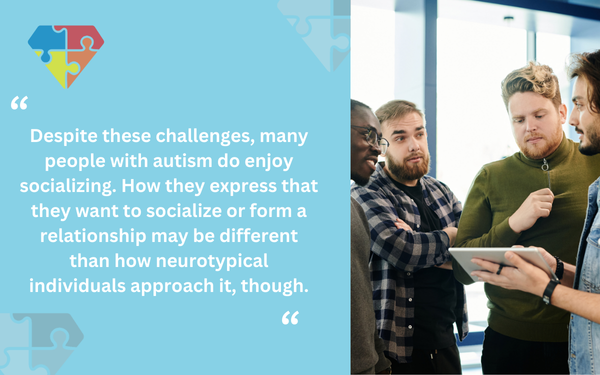Do People with Autism Enjoy Socializing?
Experiencing challenges with social interactions and social situations is something that many people with autism spectrum disorder (ASD) face every day. They often will want to have meaningful interactions with other people, but just don’t know exactly how to go about it.
For some people on the autism spectrum, the idea of socializing itself may make them feel anxious, stressed or overwhelmed. These feelings can be compounded if the interactions are taking place in a foreign environment to them.
Many times, people with autism appear to neurotypical individuals as loners. While some may spend a lot of time by themselves, it may not be because they prefer to be alone but because they don’t know how to interact appropriately with others.
Struggling with social interactions and communication are two of the hallmark challenges that many people with ASD face. Luckily, treatment plans such as applied behavior analysis (ABA therapy) can help them build these skills over time.
Below, we’ll discuss whether people with autism enjoy socializing, and how the challenges they face often affect their ability to establish, grow and maintain relationships with others.
Table Of Contents
Why Do People with Autism Have Trouble Socializing?
At the core of all social interactions is communication. If people aren’t able to effectively communicate with each other, it can be very hard for them to establish any meaningful relationship — or to connect on any level.
People with ASD often struggle with communication, though each person’s struggles can be slightly different. That being said, one area of communication that causes particular challenges for people with autism is nonverbal cues.
Everything from tone of voice to hand gestures, facial expressions and body language can be very difficult for people with autism to accurately read. This often results in a lack of understanding or misunderstanding in communication.
For example, it can be hard for a person with ASD to understand sarcasm. If someone else is using sarcasm, a person with autism may misread it as them being serious.
A 2010 study pointed out that between 60% and 65% of all communication occurs through non-verbal behaviors. It’s no surprise, then, that people on the autism spectrum who struggle with reading and accurately interpreting these non-verbal behaviors also have trouble with social interactions.
Challenges People with Autism Face in Socializing
Do People with Autism Enjoy Socializing?
Despite these challenges, many people with autism do enjoy socializing. How they express that they want to socialize or form a relationship may be different than how neurotypical individuals approach it, though.
An individual on the autism spectrum, for instance, may talk incessantly to someone else about a particular subject they are very fond of. This is a sign that they’re interested in socializing, and also a sign of their restrictive interests that many people on the spectrum have.
Unfortunately, neurotypical individuals may read this type of behavior as “weird” and out of the ordinary, and avoid communicating with them as a result. It’s difficult to teach others to recognize the signs that an individual with autism is interested in socializing, though, especially as each person can display very unique ways of expressing themselves.

Can People with Autism Improve Their Social Skills?
The good news is that people with autism can build their social interaction and communication skills so that they can form more meaningful relationships and relate to neurotypical individuals.
ABA therapy is considered the gold standard treatment for helping people with autism in this way. The evidence-based approach to learning and behavior is rooted in scientific principles that address some of the key aspects of behavior and communication.
Using positive reinforcement, repetition and many other strategies, ABA therapists can help their patients build the skills they often struggle with, and even modify some of their behaviors that might stand in the way of them socializing.
Over time, as people with autism learn the nuances of communication — including non-verbal cues that are so important — they are better able to express themselves, understand what others are truly saying and then feel more comfortable with socializing.
Blue Gems ABA Teaches Children with ASD New Skills
Many people with autism do enjoy socializing, even if the stigma is that they prefer to be alone. The neurodevelopmental disorder that they have since birth affects the way they communicate and how comfortable they feel with social interactions, which thankfully can be improved through targeted treatment.
At Blue Gems ABA, we teach children on the autism spectrum new skills. Through ABA therapy, we help them address the unique challenges that they have, taking into consideration their strengths and preferences.
We craft personalized treatment plans for each individual patient, and help them build social, communication and daily life skills while also aiding them in modifying certain behaviors.
To learn more, please contact us today.




